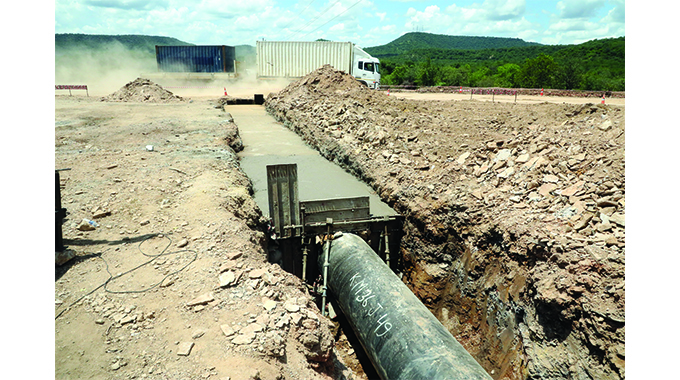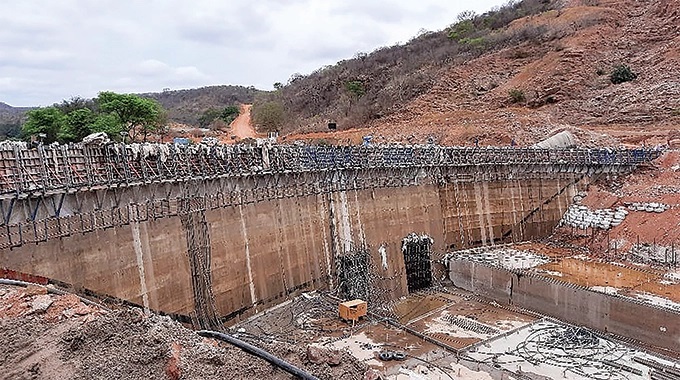
The Sunday News

Andile Tshuma, Sunday News Reporter
THE ongoing Lake Gwayi Shangani project will eclipse Bulawayo’s water needs in a landmark development that is expected to rescue the city from its perennial water shortages.

Lake Gwayi-Shangani
The Bulawayo City Council has said the city will get an estimated 220 megalitres of water delivered into the city daily. The city is currently delivering an average of 180 megalitres, with slightly more than 165 megalitres being consumed daily from its supply dams.
Speaking to Sunday News recently, the Acting Director of Engineering Services in the city Eng Sikhumbuzo Ncube said plans were underway for major refurbishments at the city’s water treatment works once the city starts receiving water from Lake Gwayi-Shangani.
“We are thankful to the central government for the ongoing Gwayi Shangani project that is still work in progress. Our hope is that when this water comes on board, which eventually it will, the city is expecting to receive 220 megalitres of water from that facility.

Deka pipeline
As I said before, we are consuming about 165 to 170 megalitres of water daily, so it will give us more than we need, what I’m emphasising is that it will totally eclipse the water that we are currently receiving from our dams. That is actually a good thing for the city,” said Eng Ncube.
He said in Phase One for the project, the water will arrive at Cowdray Park, just next to the Cowdray Park station where the city receives water from the Nyamandlovu Epping Forest water pipeline.
“We will be able to get 80 megalitres of water from the Gwayi-Shangani, and we will be able to dilute our water coming from Nyamandlovu. The treatment plant will treat 80 megalitres of water from Gwayi-Shangani and 20 megalitres from Nyamandlovu and then we will be able to pump that water to Magwegwe,” he said.

File picture: Work on Hwange Deka water pipeline project
He said Magwegwe was the biggest water reservoir, with a holding capacity of 180 megalitres, followed by Criterion with a capacity of 90 megalitres while the rest hold an average of about 60-70 megalitres of water.
He said the city has since shelved plans to reclaim sewer water for domestic purposes as the Gwayi-Shangani project is presenting long term solutions to the city’s water problems. However, the city will still reclaim waste water for use in industrial purposes and for watering stadia.
“There are some studies and assessments that are ongoing towards engaging partners to see if it’s possible to channel secondary treated water to industry for industrial purposes. Some feasibility studies have already been done and at some point, residents may have seen trenches being dug along Plumtree road, we were trying to map a way of having a pipe run underground to supply a big parastatal, which consumes a lot of water in its operations.
This will be a big relief to our supplies as the power company consumes about 15 million litres of water per day. If our studies are successful and we secure funding, it means that we would have managed to free up 15 million litres of water which we will be able to channel to residential areas, as this company will now be using secondary water.

The Lake Gwayi-Shangani dam wall
However, such developments take a lot of time and expertise,” said Eng Ncube.
Bulawayo residents and their representatives have over the years refused to drink recycled sewer water, after the idea was first mooted in consultations in 2015.
“There is technology in place to treat such kind of waste water to potable use. But we are not saying we will then force our residents to drink that water, but that is a source of water that can be used for other uses.
We already have the Gwayi Shangani coming and fitting in, so there is no need to use reclaimed water for domestic purposes. But our power plant and other industries can use this reclaimed water which would have been treated to acceptable standards and we no longer have to give them treated water from our Criterion reservoir, which should be going to residents,” he said.
Bulawayo residents are expected to get water from Gwayi-Shangani before the end of the year, with construction of the pipeline having started.



